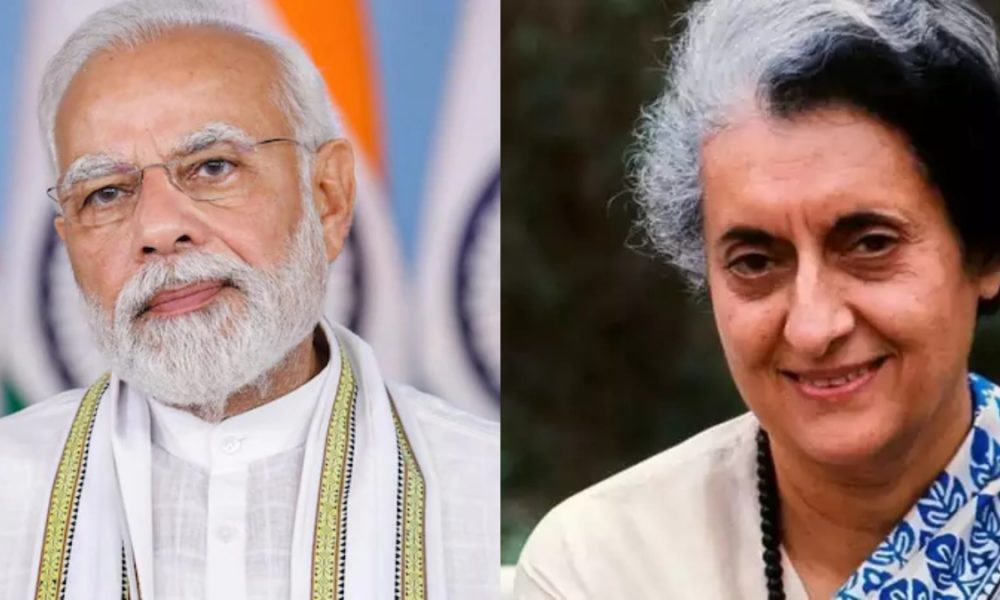


On November 19th, Prime Minister Narendra Modi honored the legacy of India's first woman Prime Minister, Indira Gandhi, on her 107th birth anniversary. Gandhi's role in uniting India is celebrated on this day, known as National Integration Day. Her contributions to national unity and development continue to inspire leaders and citizens alike. Despite her tragic assassination, Indira Gandhi's courage, leadership, and lifelong struggle for the country's well-being endure. Congress MP Rahul Gandhi and President Mallikarjun Kharge also paid tribute to their grandmother and former leader, highlighting her dedication to preserving India's unity and integrity.
Indira Gandhi: A Legacy of Unity and Strength
Indira Gandhi, India's first woman Prime Minister, left an enduring mark on the nation's history. Her unwavering commitment to national integration and development earned her widespread admiration and respect.
Early Life and Political Career
Born on November 19, 1917, Indira Priyadarshini Nehru was the daughter of India's first Prime Minister, Jawaharlal Nehru. From a young age, she was exposed to politics and played an active role in the Indian National Congress.
Gandhi's political career began in 1959 when she was elected to the Lok Sabha, the Indian parliament's lower house. She served as Minister of Information and Broadcasting under her father's government, showcasing her administrative skills.
Ascension to Prime Ministership
In 1966, Gandhi became Prime Minister following the sudden death of Lal Bahadur Shastri. She faced numerous challenges, including poverty, social unrest, and conflicts with neighboring countries.
Despite these obstacles, Gandhi's leadership was marked by bold decisions and unwavering determination. She nationalized banks, implemented land reforms, and fought against Pakistan in the 1971 Indo-Pakistani War, which led to the creation of Bangladesh.
Legacy of Unity
Gandhi's focus on national integration was particularly significant. She established National Integration Day on November 19 to commemorate her birth anniversary and promote unity among India's diverse population.
Gandhi's policies aimed at bridging religious, linguistic, and regional divides. She supported the rights of minorities, promoted secularism, and encouraged dialogue between different communities.
Assassination and Aftermath
Gandhi's tenure as Prime Minister came to a tragic end on October 31, 1984, when she was assassinated by her Sikh bodyguards. Her death sparked widespread grief and outrage across India.
Her son, Rajiv Gandhi, succeeded her as Prime Minister and continued her legacy of peace and unity. National Integration Day remains an important occasion in India, serving as a reminder of Indira Gandhi's indomitable spirit and her unwavering commitment to the nation.
FAQs
1. What was Indira Gandhi's most significant contribution? A. Her focus on national integration and unity, which helped to strengthen India's social fabric.
2. What challenges did Indira Gandhi face as Prime Minister? A. Poverty, social unrest, conflicts with neighboring countries, and internal security threats.
3. Why is National Integration Day celebrated? A. To mark the birth anniversary of Indira Gandhi and to promote unity among India's diverse population.
4. What was the significance of the 1971 Indo-Pakistani War? A. It led to the creation of Bangladesh and strengthened India's position as a regional power.
5. How did Indira Gandhi's assassination impact India? A. It was a tragic event that sparked widespread grief and outrage, but her legacy of unity and strength continues to inspire Indians to this day.

In a strongly worded statement, politician Shashi Tharoor expressed his opposition to the VB-G RAM G Bill that aims to replace MNREGA. Tharoor argued that the removal of Mahatma Gandhi's name from the scheme goes against its core values and also criticized other proposed changes such as financial alterations and a shift of responsibility to states. The politician believes that the Bill poses a threat to the principles of federalism and that the scheme should not be made subject to executive notification.

Union Minister Shivraj Singh Chouhan introduced the Viksit Bharat - Guarantee for Rozgar and Ajeevika Mission (Gramin): VB-G RAM G Bill, 2025 in the Lok Sabha. The bill aims to establish a new rural development framework aligned with the national vision of Viksit Bharat @2047 and seeks to provide a statutory guarantee of 125 days of wage employment to each rural household. The government is determined to pass the bill in this parliamentary session and failure to do so could complicate budgetary provisions.

In a significant move to improve academic standards, India's new Viksit Bharat Adhishthan Bill, 2025, places student feedback at the heart of higher education accreditation. Union Education Minister Dharmendra Pradhan, citing the National Education Policy 2020, announced that for the first time, students will have a direct impact on accreditation outcomes. The new framework will also increase institutional autonomy and encourage innovation, but with a strong emphasis on accountability through transparent student-led evaluations. The consolidation of regulators and accreditation bodies aims to streamline and strengthen the quality of higher education in India.

On the occasion of Vijay Diwas, a day commemorating India's 1971 victory over Pakistan, Rahul Gandhi, Leader of Opposition in Lok Sabha, paid his respects to the brave soldiers who showed indomitable courage, leading to the liberation of East Pakistan and the formation of Bangladesh. The date also marks the surrender of 93,000 Pakistani soldiers to the Indian Armed Forces and is a tribute to the bravery and sacrifice of Indian soldiers. Congress National President Mallikarjun Kharge also highlighted the 1971 victory as a great example of humanity and justice under the leadership of then Prime Minister Indira Gandhi.

Senior Congress leaders respond to Delhi court's refusal to take ED's chargesheet in the National Herald-Young Indian case, emphasizing the lack of evidence and foundation of the case. They accuse the BJP of exaggeration and targeting the opposition, claiming that the ruling has validated their long-held belief that the case is politically motivated. Congress leader Abhishek Manu Singhvi highlights the legality and commonality of corporate restructuring, while Congress general secretary K.C. Venugopal condemns the Modi government's targeting of Sonia Gandhi and Rahul Gandhi without any legal basis.

The Congress party declared a moral and legal triumph after the Delhi court dismissed the Enforcement Directorate's chargesheet in the National Herald-Young Indian case. The judge noted that the chargesheet was based on a private complaint rather than an FIR, making it legally inadmissible. The Congress accused the Modi government of maliciously targeting its leaders and misusing central agencies for political gain. They vowed to continue fighting for truth and democratic rights, asserting that nothing could deter them from their mission.

India commemorates Vijay Diwas every year on December 16 to honour the soldiers who sacrificed their lives during the 1971 war with Pakistan, which resulted in the creation of Bangladesh. As part of this year's celebrations, the Indian Army displayed a reconstructed Turkish armed drone, Yiiha, which was shot down by India during Operation Sindoor on May 10. The Kamikaze class of drones, also known as "suicide drones," were used by Pakistan to target Indian military and civilian installations, but were almost all destroyed by the Indian military.

India celebrates the 54th Vijay Diwas, honoring the bravery and sacrifice of its soldiers in the 1971 war that led to the liberation of Bangladesh. Political leaders, including Prime Minister Narendra Modi and President Droupadi Murmu, pay glowing tributes to the armed forces and their unmatched courage. The Army marks the occasion by recalling the historic triumph and the flawless coordination between different branches of the military, with an impressive Military Tattoo in Kolkata.

Renowned spiritual leader and former BJP MP, Ram Vilas Vedanti, passed away at the age of 67 due to a heart attack. Known for his significant role in the Ram Janmabhoomi movement, Vedanti had been admitted to a hospital in Rewa for a blood infection and low blood pressure. Attempts to transport him to a better medical facility were unsuccessful due to bad weather. Political leaders, including Uttar Pradesh Chief Minister Yogi Adityanath, expressed their condolences and praised Vedanti's contributions to society.

Indian Ambassador to the United Nations, Harish P, slammed Pakistan for misusing international platforms for its hostile agenda against India at the UNSC Open Debate on “Leadership for Peace”. He objected to Pakistan’s reference to Jammu and Kashmir and questioned its democratic credentials while reaffirming India’s stance on cross-border terrorism. This reflects the ongoing strain in India-Pakistan relations and New Delhi’s determination to counter any attempt by Islamabad to internationalise bilateral disputes.